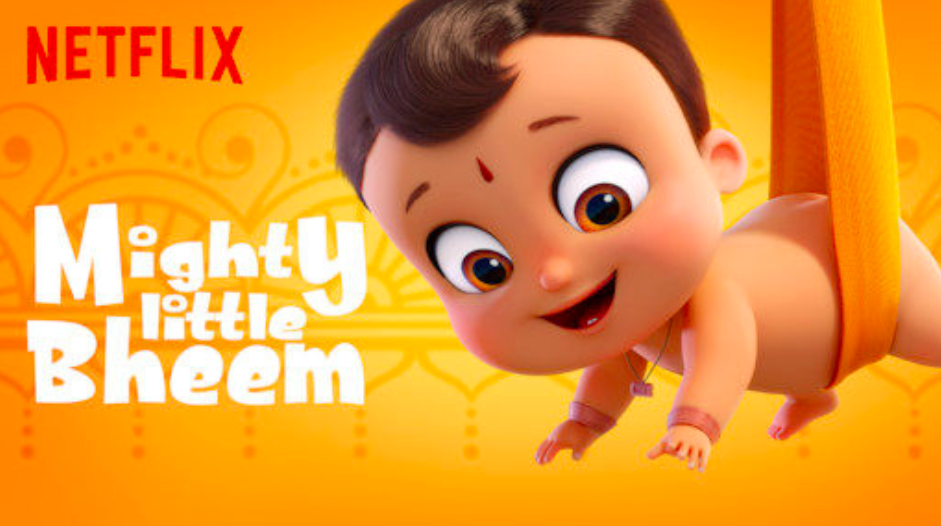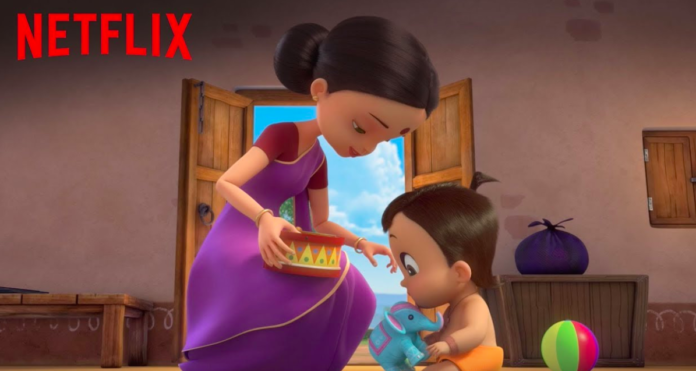Washington: ‘Chhota Bheem,’ a lovable cartoon character kid with extraordinary strength and lives in a rural Indian village in the fictional kingdom of Dholakpur, evoking laughter and thunderclaps, is once again coming to the rescue of Netflix which is financially getting hemmed by stiff competition in the US.
When it was first launched, Netflix hoped that Chhota Bheem would capture the Indian markets due to sheer volume. But just like the amazing arsenal of wonders unleashed by the baby, Chhota Bheem turned to be a money spinner for the streaming major.
Chhota Bheem captured world markets and became the second most popular original kids programme to launch on Netflix after DreamWorks Animation’s “The Boss Baby: Back in Business.”
Buoyed by the success, Chhota Bheem, created by Hyderabad-based Green Gold Animation, just unveiled its second season and last week Netflix announced that it had greenlighted a third season.
Parents and kids can look forward to binge an extra episode together without delaying bedtime for too long. The third season will include 15 episodes as well as two holiday specials.
Other international animated originals coming to Netflix include “Dino Girl Gauko” from Japan, “The Nutty Boy ” from Brazil and the Zambian story “Mama K’s Team 4”. In addition to kid-centric shows, Netflix also has live-action productions in Hindi. The company recently announced five new originals in India, including “Betaal, “a series that pits police against zombie redcoats.
But it is Chhota Bheem that stands out and is popular in US, Brazil and other countries.

Chhota Bheem has come to the aid of Netflix when it is facing a slowdown in subscribers in the US as more streaming competitors have entered the market. Research firm eMarketer estimates that Netflix will see a drop in its market share this year, capturing 87 % of US consumers who pay to stream video on the internet, down from 90 % in 2014. By 2023, Netflix’s market share will drop to about 86 % as Hulu and Amazon gain more business.
More competitors will also enter the market later this year, including streaming services Disney + and Apple TV +.
Thus, for Netflix to continue to make money and expand its audience it will have to start coming increasingly from other countries. And India tops the list because of the huge volume of business.
Chhota Bheem was created by Green Gold Animation, which already had a popular animated series in India. While the Hyderabad-based company wanted to reach international audiences, Netflix wanted to expand its reach in India.
The two struck a rare chemistry in 2016. Netflix wanted to create a show with Green Gold and felt that there was a lack of preschool content in India.
While the streaming giant sought to increase its reach in India, it was also eager to broaden the appeal of the series globally, so changes were made. The new series would feature Bheem as a baby and scenes were adjusted.
Though the program is distinctly Indian, the absence of dialogue and universal themes such as Bheem’s loving bond with his mother made it a hit across the globe on Netflix. A “Mighty Little Bheem ” clip on the Netflix Kids & Family YouTube Channel uploaded in May was the site’s highest performing video, attracting about 80 million views as of July 22.
Chhota Bheem has given a big boost to Green Gold and the company now employs 1, 400 people with offices in India, Los Angeles, Singapore and the Philippines.
India is a significant market for Netflix, based on its population size of more than 1.3 billion and growing affluence. The number of Netflix subscribers in India is rapidly increasing, growing from just 1.4 million in 2018 to 4.1 million in 2019, according to research firm IHS Markit. One of its major streaming competitors there is Amazon Prime Video, which continues to best Netflix in the country with 4.4 million subscribers.
This is because Netflix subscription is higher than Amazon Prime Video.
“Growth in that country (India) is a marathon. So we’re in it for the long haul, and we’re seeing nice, steady progress,” Ted Sarandos, Netflix’s chief content officer, said in a presentation to investors in July.





















































